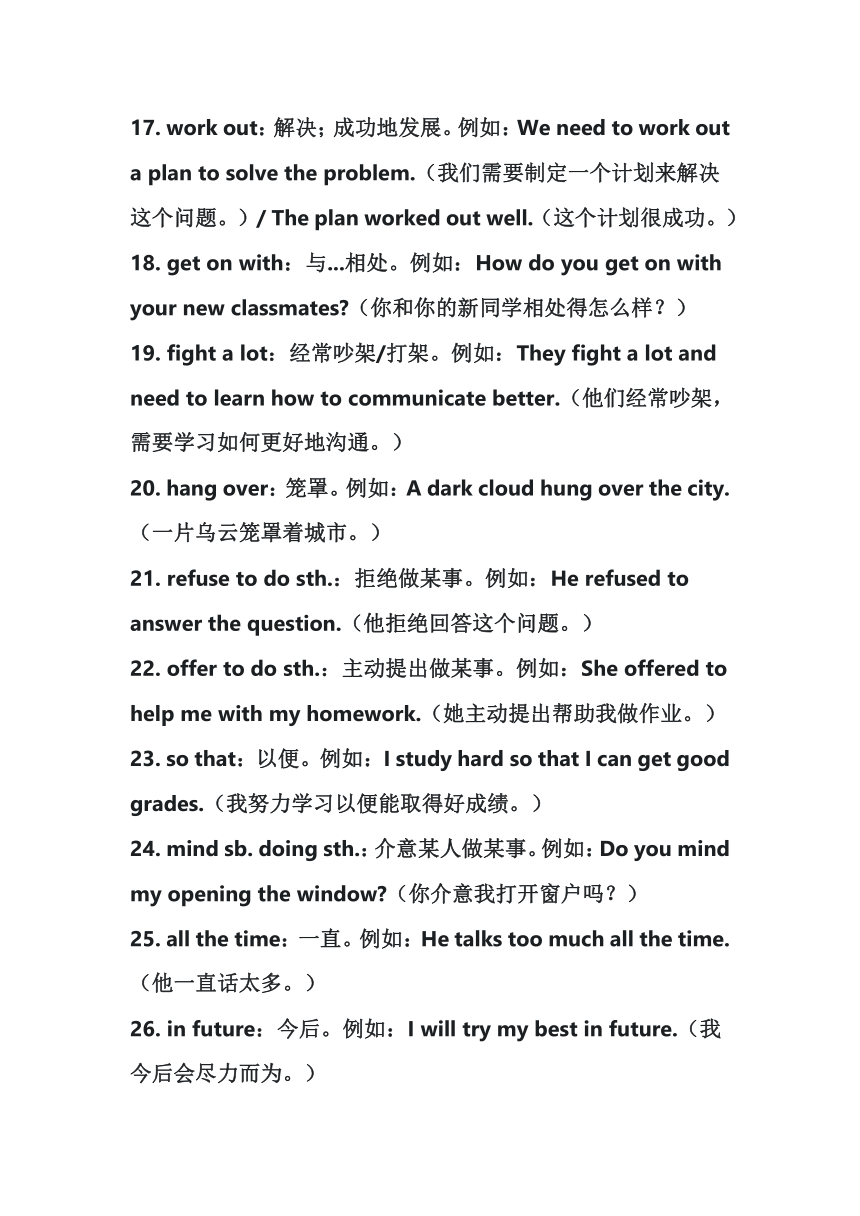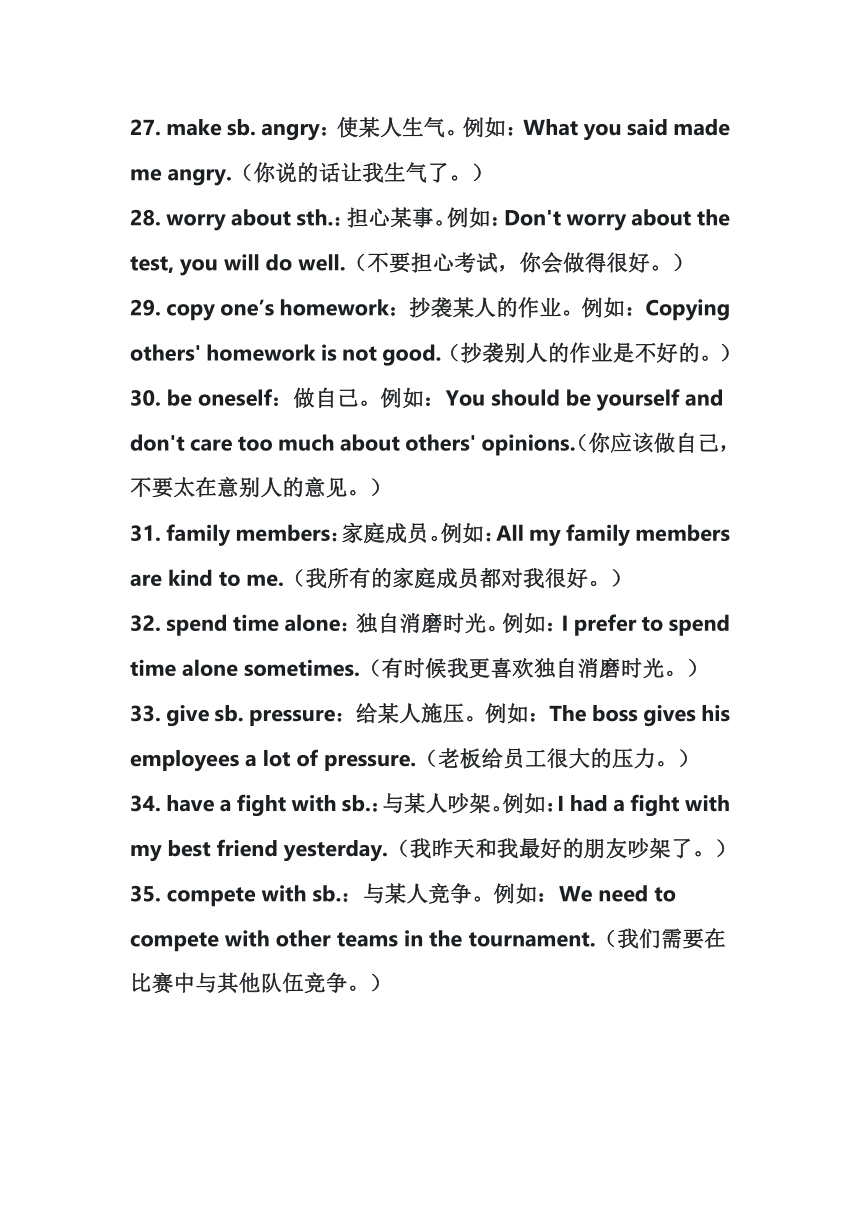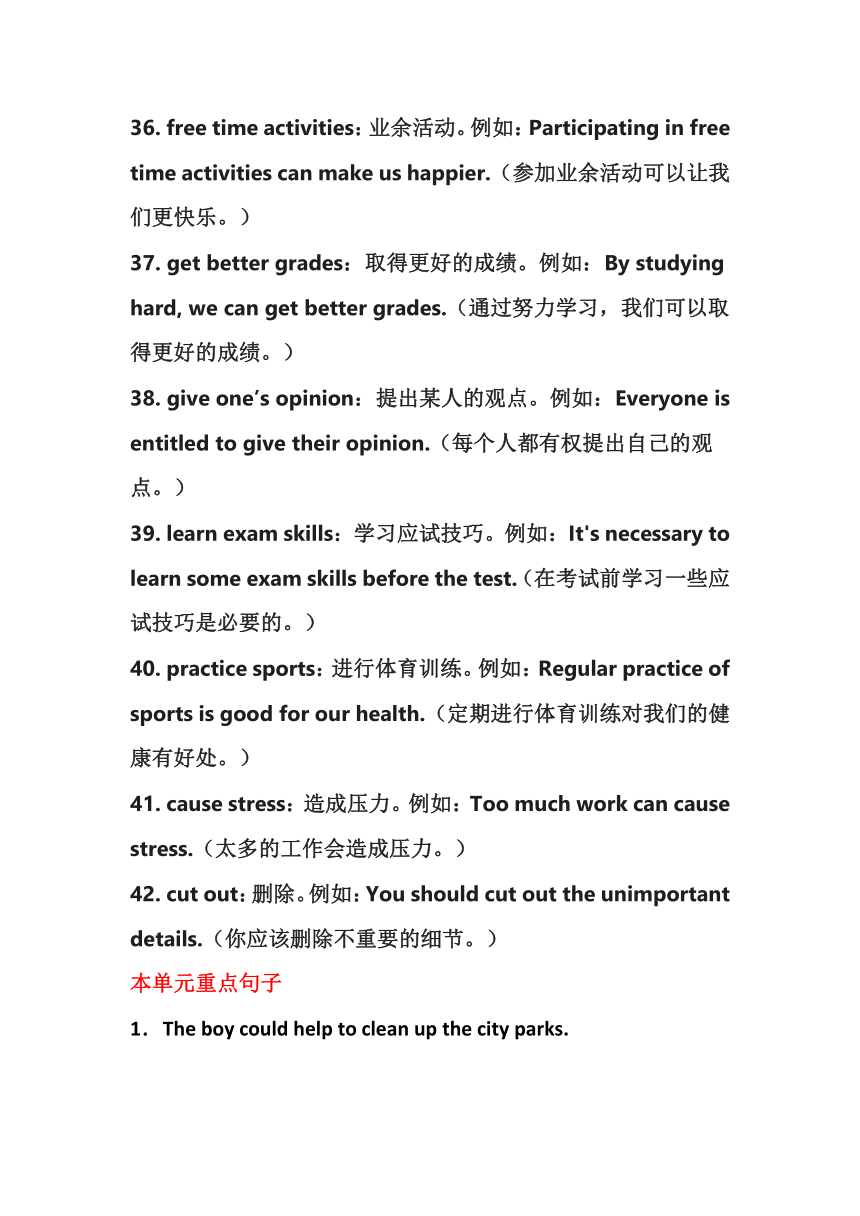Unit 4 Why don't you talk to your parents?单元知识点总结
文档属性
| 名称 | Unit 4 Why don't you talk to your parents?单元知识点总结 |

|
|
| 格式 | docx | ||
| 文件大小 | 21.0KB | ||
| 资源类型 | 教案 | ||
| 版本资源 | 人教新目标(Go for it)版 | ||
| 科目 | 英语 | ||
| 更新时间 | 2024-02-25 00:00:00 | ||
图片预览





文档简介
2024学年人教版八年级英语下册Unit4单元知识点总结
本单元重点短语的具体用法
1. have free time:表示有空闲时间。例如:I hope to have free time to read books.(我希望有空闲时间读书。)
2. allow sb. to do sth.:允许某人做某事。例如:My parents allow me to play basketball on weekends.(我父母允许我在周末打篮球。)
3. hang out with sb.:与某人闲逛。例如:I like to hang out with my friends on Sundays.(我喜欢在周日和我的朋友们闲逛。)
4. after-school classes:课外活动课。例如:She takes many after-school classes to improve her skills.(她参加很多课外活动课来提高她的技能。)
5. get into a fight with sb.:与某人吵架/打架。例如:He got into a fight with his classmate yesterday.(他昨天和他的同学吵架了。)
6. until midnight:直到半夜。例如:She often stays up until midnight to finish her homework.(她经常熬夜到半夜完成作业。)
7. talk to sb.:与某人交谈。例如:The teacher talked to me about my study.(老师和我谈论了我的学习。)
8. too many:太多,修饰可数名词。例如:There are too many books on the desk.(桌子上有太多书了。)
9. study too much:学得过多。例如:He studies too much and needs to relax.(他学得太多了,需要放松一下。)
10. get enough sleep:有足够的睡眠。例如:It's important to get enough sleep for good health.(有足够的睡眠对健康很重要。)
11. write sb. a letter:给某人写信。例如:I will write you a letter when I arrive at the destination.(我到达目的地后会给你写信。)
12. call sb. up:打电话给某人。例如:Remember to call me up when you get home.(记得到家后给我打电话。)
13. surprise sb.:令某人惊讶。例如:His answer surprised all of us.(他的回答令我们所有人都很惊讶。)
14. look through:翻看。例如:She looked through the magazine quickly.(她快速地翻看了那本杂志。)
15. be angry with sb.:生某人的气。例如:I was angry with him for being late.(我因为他迟到而生他的气。)
16. a big deal:重要的事。例如:Don't worry, it's not a big deal.(别担心,这没什么大不了的。)
17. work out:解决;成功地发展。例如:We need to work out a plan to solve the problem.(我们需要制定一个计划来解决这个问题。)/ The plan worked out well.(这个计划很成功。)
18. get on with:与...相处。例如:How do you get on with your new classmates (你和你的新同学相处得怎么样?)
19. fight a lot:经常吵架/打架。例如:They fight a lot and need to learn how to communicate better.(他们经常吵架,需要学习如何更好地沟通。)
20. hang over:笼罩。例如:A dark cloud hung over the city.(一片乌云笼罩着城市。)
21. refuse to do sth.:拒绝做某事。例如:He refused to answer the question.(他拒绝回答这个问题。)
22. offer to do sth.:主动提出做某事。例如:She offered to help me with my homework.(她主动提出帮助我做作业。)
23. so that:以便。例如:I study hard so that I can get good grades.(我努力学习以便能取得好成绩。)
24. mind sb. doing sth.:介意某人做某事。例如:Do you mind my opening the window (你介意我打开窗户吗?)
25. all the time:一直。例如:He talks too much all the time.(他一直话太多。)
26. in future:今后。例如:I will try my best in future.(我今后会尽力而为。)
27. make sb. angry:使某人生气。例如:What you said made me angry.(你说的话让我生气了。)
28. worry about sth.:担心某事。例如:Don't worry about the test, you will do well.(不要担心考试,你会做得很好。)
29. copy one’s homework:抄袭某人的作业。例如:Copying others' homework is not good.(抄袭别人的作业是不好的。)
30. be oneself:做自己。例如:You should be yourself and don't care too much about others' opinions.(你应该做自己,不要太在意别人的意见。)
31. family members:家庭成员。例如:All my family members are kind to me.(我所有的家庭成员都对我很好。)
32. spend time alone:独自消磨时光。例如:I prefer to spend time alone sometimes.(有时候我更喜欢独自消磨时光。)
33. give sb. pressure:给某人施压。例如:The boss gives his employees a lot of pressure.(老板给员工很大的压力。)
34. have a fight with sb.:与某人吵架。例如:I had a fight with my best friend yesterday.(我昨天和我最好的朋友吵架了。)
pete with sb.:与某人竞争。例如:We need to compete with other teams in the tournament.(我们需要在比赛中与其他队伍竞争。)
36. free time activities:业余活动。例如:Participating in free time activities can make us happier.(参加业余活动可以让我们更快乐。)
37. get better grades:取得更好的成绩。例如:By studying hard, we can get better grades.(通过努力学习,我们可以取得更好的成绩。)
38. give one’s opinion:提出某人的观点。例如:Everyone is entitled to give their opinion.(每个人都有权提出自己的观点。)
39. learn exam skills:学习应试技巧。例如:It's necessary to learn some exam skills before the test.(在考试前学习一些应试技巧是必要的。)
40. practice sports:进行体育训练。例如:Regular practice of sports is good for our health.(定期进行体育训练对我们的健康有好处。)
41. cause stress:造成压力。例如:Too much work can cause stress.(太多的工作会造成压力。)
42. cut out:删除。例如:You should cut out the unimportant details.(你应该删除不重要的细节。)
本单元重点句子
1.The boy could help to clean up the city parks.
男孩可以帮助打扫城市公园。
2.I'm making some plans to work in an old people's home this summer.
我正在制订一些计划,准备今年夏天去养老院工作。
3.I want to learn more about how to care for animals.
我想更多地了解如何照顾动物。
4.She decided to try out for an after school reading program.
她决定参加一个课外阅读项目。
5.You can see in their eyes that they're going on a different journey with each new book.
在他们的眼睛里你会发现,每读一本新书,他们都在经历一次不同的旅行。
6.I can do what I love to do and help others at the same time.
我可以做我喜欢做的事,同时也能帮助别人。
7.Volunteering our time to help these people is a good way to spend our free time.
拿出时间来自愿帮助这些人是我们度过闲暇时光的好办法。
8.I'd like to thank you for giving money to Animal Helpers.
我要感谢您捐钱给“动物助手”组织。
9.I'm sure you know that this group was set up to help disabled people like me.
我确信你知道成立这个团体是为了帮助像我这样的残疾人。
10.You helped to make it possible for me to have Lucky.
你的帮助使我拥有Lucky成为可能。
本单元重点语法讲解
状语从句(一)
一、until的用法
until意为“直到”,引导时间状语从句。
"Until" 在英语中考中有以下常见用法:
1. 引导时间状语从句:表示动作或状态持续到某个时间点。例如:I will wait for you until you come back.(我会等你直到你回来。)
2. 与 not 连用:表示直到某个时间点才开始某个动作。例如:He didn't go to bed until 11 o'clock.(他直到 11 点才去睡觉。)
3. 用于强调:可以放在句首或句中,强调某个动作或情况的持续性。例如:Until then, I had never thought about it.(在那之前,我从未想过这件事。)
4. 固定短语:如 "not...until"(直到......才),"until recently"(直到最近)等。例如:I didn't realize how important it was until recently.(直到最近我才意识到它有多么重要。)
在中考中,需要注意以下几点:
1. 注意until 引导时间状语从句时的时态,主句和从句的时态可能会有所不同。
2. 理解 "not...until" 结构的含义和用法,它表示的是一个时间上的先后顺序。
3. 注意句子的逻辑和语境,确保使用 "until" 的句子表达清晰、准确。
4. 通过阅读和练习,熟悉 "until" 的各种用法和常见的考点。
二、so that的用法
so that意为“以便”,引导目的状语从句。如:
We started early so that we could catch the early bus.
我们很早就出发了,以便能赶上早班车。
三、although的用法
although意为“尽管”,引导让步状语从句,一般位于句首。它所引导的从句不能与并列连词 but,and,so 等连用,但可以与 yet,still等词连用。如:
Although it was expensive,we still decided to buy it.虽然它很贵,我们还是决定买。
though也可以用于引导让步状语从句,此时其意义和用法与although相同。如:
Though we only stayed there for a few days,we had a good time.
虽然我们只在那里待了几天,但我们玩得很愉快。
重点句型详细讲解:
1. Why don’t you talk to your parents?
“Why don’t you + 动词原形 + 其他?”相当于“Why not + 动词原形 + 其他?”意为“为什么不……?”并不表示疑问,而是作建议、询问。例如:
Why don’t you go with us = Why not go with us
为什么不同我们一起去呢?
Why don’t you go swimming = Why not go swimming
为什么不去游泳呢?
why not用在口语中表示赞同,意为“当然,好啊”。例如:
— Let’s go to the movies. 我们看电影吧。
— Why not 好啊!
2. I’m really tired because I studied until midnight last night.
until意为“直到……”,有下列用法:
(1)作介词,后接时间名词,在句中作时间状语。例如:
She waited there until 9 o’clock. 她一直等到9点钟。
(2)作连词,后接从句,引导时间状语从句。例如:
We waited until the rain stopped. 我们等到雨停了。
3. I’m not good at writing.
be good at意为“擅长……”,后接名词、代词或动词-ing形式。例如:
I’m good at playing chess. 我擅长下象棋。
We should be good at learning from each other.
我们应该善于互相学习。
4. Although she’s wrong, it’s not a big deal.
although作连词,相当于though,意为“尽管,虽然”,用来引导让步状语从句。它所引导的从句不能与并列连词but; and; so等连用,但可以和yet; still等词连用。例如:
Although he lives alone, he doesn’t feel lonely.
= He lives alone, but he doesn’t feel lonely.
虽然他一个人住,但他并不感到孤独。
There is air all around us, although we cannot see it.
虽然我们看不见空气,但空气却存在于我们的周围。
5. I hope things will be better for you soon.
hope作动词,意为“希望”,用于表示有可能实现的愿望,其后可接不定式或宾语从句,但表达“希望别人做某事”时则需用hope that从句。例如:
I hope to watch the football match again.
我希望再看一次那场足球赛。
I hope you can pass the exam.
我希望你能通过考试。
作文训练
写作任务1
假设你是李华,你的朋友刘明在学习、生活等方面遇到了一些问题和困难,所以他经常感到焦虑和郁闷,请你根据以下内容给他发一份电子邮件,帮助他克服焦虑情绪,轻松、快乐地学习和生活。
内容包括:1. 每个人都会有苦恼、焦虑的时候。
2. 一定要告诉别人你的烦恼。
3. 遇到任何困难时,与同学交流或和老师、家长及时沟通。
4. 可就如何轻松、快乐地学习和生活等适当发挥。
要求:语句连贯,不少于80词。
Dear Liu Ming,
I'm sorry to hear that you often feel anxious and sad because of some problems in study and life. Everyone may feel worried or sad sometimes. You should tell others when you are anxious.It's good to communicate with your classmates, teachers or parents when you are in trouble. Thus, you can workout the problems from study or life easily. Listening to music or taking part in outdoor activities is another way to help you get relaxed.Try to smile at yourself and never keep silent about your problems
No matter how many difficulties you have, I believe all of them can be overcome in the end.
Yours,
Li Hua
本单元重点短语的具体用法
1. have free time:表示有空闲时间。例如:I hope to have free time to read books.(我希望有空闲时间读书。)
2. allow sb. to do sth.:允许某人做某事。例如:My parents allow me to play basketball on weekends.(我父母允许我在周末打篮球。)
3. hang out with sb.:与某人闲逛。例如:I like to hang out with my friends on Sundays.(我喜欢在周日和我的朋友们闲逛。)
4. after-school classes:课外活动课。例如:She takes many after-school classes to improve her skills.(她参加很多课外活动课来提高她的技能。)
5. get into a fight with sb.:与某人吵架/打架。例如:He got into a fight with his classmate yesterday.(他昨天和他的同学吵架了。)
6. until midnight:直到半夜。例如:She often stays up until midnight to finish her homework.(她经常熬夜到半夜完成作业。)
7. talk to sb.:与某人交谈。例如:The teacher talked to me about my study.(老师和我谈论了我的学习。)
8. too many:太多,修饰可数名词。例如:There are too many books on the desk.(桌子上有太多书了。)
9. study too much:学得过多。例如:He studies too much and needs to relax.(他学得太多了,需要放松一下。)
10. get enough sleep:有足够的睡眠。例如:It's important to get enough sleep for good health.(有足够的睡眠对健康很重要。)
11. write sb. a letter:给某人写信。例如:I will write you a letter when I arrive at the destination.(我到达目的地后会给你写信。)
12. call sb. up:打电话给某人。例如:Remember to call me up when you get home.(记得到家后给我打电话。)
13. surprise sb.:令某人惊讶。例如:His answer surprised all of us.(他的回答令我们所有人都很惊讶。)
14. look through:翻看。例如:She looked through the magazine quickly.(她快速地翻看了那本杂志。)
15. be angry with sb.:生某人的气。例如:I was angry with him for being late.(我因为他迟到而生他的气。)
16. a big deal:重要的事。例如:Don't worry, it's not a big deal.(别担心,这没什么大不了的。)
17. work out:解决;成功地发展。例如:We need to work out a plan to solve the problem.(我们需要制定一个计划来解决这个问题。)/ The plan worked out well.(这个计划很成功。)
18. get on with:与...相处。例如:How do you get on with your new classmates (你和你的新同学相处得怎么样?)
19. fight a lot:经常吵架/打架。例如:They fight a lot and need to learn how to communicate better.(他们经常吵架,需要学习如何更好地沟通。)
20. hang over:笼罩。例如:A dark cloud hung over the city.(一片乌云笼罩着城市。)
21. refuse to do sth.:拒绝做某事。例如:He refused to answer the question.(他拒绝回答这个问题。)
22. offer to do sth.:主动提出做某事。例如:She offered to help me with my homework.(她主动提出帮助我做作业。)
23. so that:以便。例如:I study hard so that I can get good grades.(我努力学习以便能取得好成绩。)
24. mind sb. doing sth.:介意某人做某事。例如:Do you mind my opening the window (你介意我打开窗户吗?)
25. all the time:一直。例如:He talks too much all the time.(他一直话太多。)
26. in future:今后。例如:I will try my best in future.(我今后会尽力而为。)
27. make sb. angry:使某人生气。例如:What you said made me angry.(你说的话让我生气了。)
28. worry about sth.:担心某事。例如:Don't worry about the test, you will do well.(不要担心考试,你会做得很好。)
29. copy one’s homework:抄袭某人的作业。例如:Copying others' homework is not good.(抄袭别人的作业是不好的。)
30. be oneself:做自己。例如:You should be yourself and don't care too much about others' opinions.(你应该做自己,不要太在意别人的意见。)
31. family members:家庭成员。例如:All my family members are kind to me.(我所有的家庭成员都对我很好。)
32. spend time alone:独自消磨时光。例如:I prefer to spend time alone sometimes.(有时候我更喜欢独自消磨时光。)
33. give sb. pressure:给某人施压。例如:The boss gives his employees a lot of pressure.(老板给员工很大的压力。)
34. have a fight with sb.:与某人吵架。例如:I had a fight with my best friend yesterday.(我昨天和我最好的朋友吵架了。)
pete with sb.:与某人竞争。例如:We need to compete with other teams in the tournament.(我们需要在比赛中与其他队伍竞争。)
36. free time activities:业余活动。例如:Participating in free time activities can make us happier.(参加业余活动可以让我们更快乐。)
37. get better grades:取得更好的成绩。例如:By studying hard, we can get better grades.(通过努力学习,我们可以取得更好的成绩。)
38. give one’s opinion:提出某人的观点。例如:Everyone is entitled to give their opinion.(每个人都有权提出自己的观点。)
39. learn exam skills:学习应试技巧。例如:It's necessary to learn some exam skills before the test.(在考试前学习一些应试技巧是必要的。)
40. practice sports:进行体育训练。例如:Regular practice of sports is good for our health.(定期进行体育训练对我们的健康有好处。)
41. cause stress:造成压力。例如:Too much work can cause stress.(太多的工作会造成压力。)
42. cut out:删除。例如:You should cut out the unimportant details.(你应该删除不重要的细节。)
本单元重点句子
1.The boy could help to clean up the city parks.
男孩可以帮助打扫城市公园。
2.I'm making some plans to work in an old people's home this summer.
我正在制订一些计划,准备今年夏天去养老院工作。
3.I want to learn more about how to care for animals.
我想更多地了解如何照顾动物。
4.She decided to try out for an after school reading program.
她决定参加一个课外阅读项目。
5.You can see in their eyes that they're going on a different journey with each new book.
在他们的眼睛里你会发现,每读一本新书,他们都在经历一次不同的旅行。
6.I can do what I love to do and help others at the same time.
我可以做我喜欢做的事,同时也能帮助别人。
7.Volunteering our time to help these people is a good way to spend our free time.
拿出时间来自愿帮助这些人是我们度过闲暇时光的好办法。
8.I'd like to thank you for giving money to Animal Helpers.
我要感谢您捐钱给“动物助手”组织。
9.I'm sure you know that this group was set up to help disabled people like me.
我确信你知道成立这个团体是为了帮助像我这样的残疾人。
10.You helped to make it possible for me to have Lucky.
你的帮助使我拥有Lucky成为可能。
本单元重点语法讲解
状语从句(一)
一、until的用法
until意为“直到”,引导时间状语从句。
"Until" 在英语中考中有以下常见用法:
1. 引导时间状语从句:表示动作或状态持续到某个时间点。例如:I will wait for you until you come back.(我会等你直到你回来。)
2. 与 not 连用:表示直到某个时间点才开始某个动作。例如:He didn't go to bed until 11 o'clock.(他直到 11 点才去睡觉。)
3. 用于强调:可以放在句首或句中,强调某个动作或情况的持续性。例如:Until then, I had never thought about it.(在那之前,我从未想过这件事。)
4. 固定短语:如 "not...until"(直到......才),"until recently"(直到最近)等。例如:I didn't realize how important it was until recently.(直到最近我才意识到它有多么重要。)
在中考中,需要注意以下几点:
1. 注意until 引导时间状语从句时的时态,主句和从句的时态可能会有所不同。
2. 理解 "not...until" 结构的含义和用法,它表示的是一个时间上的先后顺序。
3. 注意句子的逻辑和语境,确保使用 "until" 的句子表达清晰、准确。
4. 通过阅读和练习,熟悉 "until" 的各种用法和常见的考点。
二、so that的用法
so that意为“以便”,引导目的状语从句。如:
We started early so that we could catch the early bus.
我们很早就出发了,以便能赶上早班车。
三、although的用法
although意为“尽管”,引导让步状语从句,一般位于句首。它所引导的从句不能与并列连词 but,and,so 等连用,但可以与 yet,still等词连用。如:
Although it was expensive,we still decided to buy it.虽然它很贵,我们还是决定买。
though也可以用于引导让步状语从句,此时其意义和用法与although相同。如:
Though we only stayed there for a few days,we had a good time.
虽然我们只在那里待了几天,但我们玩得很愉快。
重点句型详细讲解:
1. Why don’t you talk to your parents?
“Why don’t you + 动词原形 + 其他?”相当于“Why not + 动词原形 + 其他?”意为“为什么不……?”并不表示疑问,而是作建议、询问。例如:
Why don’t you go with us = Why not go with us
为什么不同我们一起去呢?
Why don’t you go swimming = Why not go swimming
为什么不去游泳呢?
why not用在口语中表示赞同,意为“当然,好啊”。例如:
— Let’s go to the movies. 我们看电影吧。
— Why not 好啊!
2. I’m really tired because I studied until midnight last night.
until意为“直到……”,有下列用法:
(1)作介词,后接时间名词,在句中作时间状语。例如:
She waited there until 9 o’clock. 她一直等到9点钟。
(2)作连词,后接从句,引导时间状语从句。例如:
We waited until the rain stopped. 我们等到雨停了。
3. I’m not good at writing.
be good at意为“擅长……”,后接名词、代词或动词-ing形式。例如:
I’m good at playing chess. 我擅长下象棋。
We should be good at learning from each other.
我们应该善于互相学习。
4. Although she’s wrong, it’s not a big deal.
although作连词,相当于though,意为“尽管,虽然”,用来引导让步状语从句。它所引导的从句不能与并列连词but; and; so等连用,但可以和yet; still等词连用。例如:
Although he lives alone, he doesn’t feel lonely.
= He lives alone, but he doesn’t feel lonely.
虽然他一个人住,但他并不感到孤独。
There is air all around us, although we cannot see it.
虽然我们看不见空气,但空气却存在于我们的周围。
5. I hope things will be better for you soon.
hope作动词,意为“希望”,用于表示有可能实现的愿望,其后可接不定式或宾语从句,但表达“希望别人做某事”时则需用hope that从句。例如:
I hope to watch the football match again.
我希望再看一次那场足球赛。
I hope you can pass the exam.
我希望你能通过考试。
作文训练
写作任务1
假设你是李华,你的朋友刘明在学习、生活等方面遇到了一些问题和困难,所以他经常感到焦虑和郁闷,请你根据以下内容给他发一份电子邮件,帮助他克服焦虑情绪,轻松、快乐地学习和生活。
内容包括:1. 每个人都会有苦恼、焦虑的时候。
2. 一定要告诉别人你的烦恼。
3. 遇到任何困难时,与同学交流或和老师、家长及时沟通。
4. 可就如何轻松、快乐地学习和生活等适当发挥。
要求:语句连贯,不少于80词。
Dear Liu Ming,
I'm sorry to hear that you often feel anxious and sad because of some problems in study and life. Everyone may feel worried or sad sometimes. You should tell others when you are anxious.It's good to communicate with your classmates, teachers or parents when you are in trouble. Thus, you can workout the problems from study or life easily. Listening to music or taking part in outdoor activities is another way to help you get relaxed.Try to smile at yourself and never keep silent about your problems
No matter how many difficulties you have, I believe all of them can be overcome in the end.
Yours,
Li Hua
同课章节目录
- Unit 1 What's the matter?
- Section A
- Section B
- Unit 2 I'll help to clean up the city parks.
- Section A
- Section B
- Unit 3 Could you please clean your room?
- Section A
- Section B
- Unit 4 Why don't you talk to your parents?
- Section A
- Section B
- Unit 5 What were you doing when the rainstorm came
- Section A
- Section B
- Review of Units 1-5
- Unit 6 An old man tried to move the mountains.
- Section A
- Section B
- Unit 7 What's the highest mountain in the world?
- Section A
- Section B
- Unit 8 Have you read Treasure Island yet?
- Section A
- Section B
- Unit 9 Have you ever been to a museum?
- Section A
- Section B
- Unit 10 I've had this bike for three years.
- Section A
- Section B
